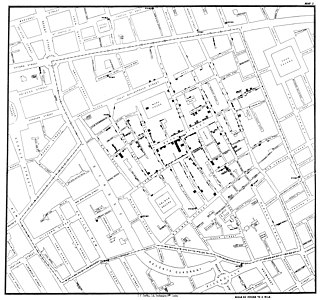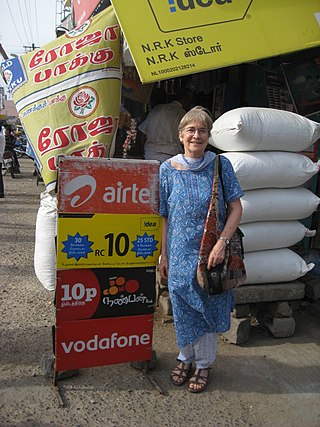
Human geography or anthropogeography is the branch of geography which studies spatial relationships between human communities, cultures, economies, and their interactions with the environment, examples of which include urban sprawl and urban redevelopment. It analyzes spatial interdependencies between social interactions and the environment through qualitative and quantitative methods.

A geographer is a physical scientist, social scientist or humanist whose area of study is geography, the study of Earth's natural environment and human society, including how society and nature interacts. The Greek prefix "geo" means "earth" and the Greek suffix, "graphy", meaning "description", so a geographer is someone who studies the earth. The word "geography" is a Middle French word that is believed to have been first used in 1540.

Ellen Churchill Semple was an American geographer and the first female president of the Association of American Geographers. She contributed significantly to the early development of the discipline of geography in the United States, particularly studies of human geography. She is most closely associated with work in anthropogeography and environmentalism, and the debate about "environmental determinism".

The quantitative revolution (QR) was a paradigm shift that sought to develop a more rigorous and systematic methodology for the discipline of geography. It came as a response to the inadequacy of regional geography to explain general spatial dynamics. The main claim for the quantitative revolution is that it led to a shift from a descriptive (idiographic) geography to an empirical law-making (nomothetic) geography. The quantitative revolution occurred during the 1950s and 1960s and marked a rapid change in the method behind geographical research, from regional geography into a spatial science.

Cultural geography is a subfield within human geography. Though the first traces of the study of different nations and cultures on Earth can be dated back to ancient geographers such as Ptolemy or Strabo, cultural geography as academic study firstly emerged as an alternative to the environmental determinist theories of the early 20th century, which had believed that people and societies are controlled by the environment in which they develop. Rather than studying pre-determined regions based upon environmental classifications, cultural geography became interested in cultural landscapes. This was led by the "father of cultural geography" Carl O. Sauer of the University of California, Berkeley. As a result, cultural geography was long dominated by American writers.
Non-representational theory is the study of a specific theory focused on human geography. It is the work of Nigel Thrift. The theory is based on using social theory, conducting geographical research, and the 'embodied experience.'

Doreen Barbara Massey was a British social scientist and geographer. She specialized in Marxist geography, feminist geography, and cultural geography, as well as other topics. She was Professor of Geography at the Open University.
Feminist political ecology is a feminist perspective on political ecology, drawing on theories from Marxism, post-structuralism, feminist geography, ecofeminism and cultural ecology. Feminist political ecology examines the place of intersectional social relations in the political ecological landscape, exploring them as a factor in ecological and political relations. Specific areas in which feminist political ecology is focused are development, landscape, resource use, agrarian reconstruction and rural-urban transformation. Feminist political ecologists suggest gender is a crucial variable – in relation to class, race and other relevant dimensions of political ecological life – in constituting access to, control over, and knowledge of natural resources.

John Richard Urry was a British sociologist who served as a professor at Lancaster University. He is noted for work in the fields of the sociology of tourism and mobility.
Cindi Katz, a geographer, is Professor in Environmental Psychology, Earth and Environmental Sciences, American Studies, and Women's Studies at the CUNY Graduate Center. Her work concerns social reproduction and the production of space, place and nature; children and the environment; the consequences of global economic restructuring for everyday life; the privatization of the public environment, the intertwining of memory and history in the geographical imagination, and the intertwined spatialities of homeland and home-based security. She is known for her work on social reproduction and everyday life, research on children's geographies, her intervention on "minor theory", and the notion of counter-topography, which is a means of recognizing the historical and geographical specificities of particular places while inferring their analytic connections to specific material social practices.
Noel Castree FAcSS is a British geographer whose research has focused on capitalism-environment relationships and, more recently, on the role that various experts play in discourses about global environmental change. He is currently at the University of Manchester. He is also the editor-in-chief of the peer-reviewed journal Progress in Human Geography.
Owain Jones FGS is a Professor of Environmental Humanities at Bath Spa University (UK). He was previously Reader in Cultural Geography: Place, Nature and Landscape at the Countryside & Community Research Institute and member of staff of the Department of Geography and Environmental Management, Faculty of Environment and Technology, University of the West of England.

Eric Sheppard is a British and American geographer, and Professor of Economic geography at UCLA.

Martha Chen is an American academic, scholar and social worker, who is presently a lecturer in public policy at the Harvard Kennedy School and senior advisor of the global research-policy-action network WIEGO and a member of the Advisory Board of the United Nations University World Institute for Development Economics Research (UNU-WIDER). Martha is a development practitioner and scholar who has worked with the working poor in India, South Asia, and around the world. Her areas of specialization are employment, poverty alleviation, informal economy, and gender. She lived in Bangladesh working with BRAC, one of the world's largest non-governmental organizations, and in India, as field representative of Oxfam America for India and Bangladesh for 15 years.
Ian Gordon Simmons is a British geographer. He retired as Professor of Geography from the University of Durham in 2001. He has made significant contributions to environmental history and prehistoric archaeology.

Anne Buttimer was an Irish geographer. She was emeritus professor of geography at University College, Dublin.

Ecofeminism is a branch of feminism and political ecology. Ecofeminist thinkers draw on the concept of gender to analyse the relationships between humans and the natural world. The term was coined by the French writer Françoise d'Eaubonne in her book Le Féminisme ou la Mort (1974). Ecofeminist theory asserts a feminist perspective of Green politics that calls for an egalitarian, collaborative society in which there is no one dominant group. Today, there are several branches of ecofeminism, with varying approaches and analyses, including liberal ecofeminism, spiritual/cultural ecofeminism, and social/socialist ecofeminism. Interpretations of ecofeminism and how it might be applied to social thought include ecofeminist art, social justice and political philosophy, religion, contemporary feminism, and poetry.

Melissa Leach, is a British geographer and social anthropologist. She studies sustainability and development concerns in policy-making and has a focus on the politics of science and technology of Africa. As of 2017 she was the Director of the Institute of Development Studies (IDS) located on the University of Sussex campus.

Barbara Harriss-White is an English economist and emeritus professor of development studies. She was trained in geography, agricultural science, agricultural economics and self-taught in development economics. In the 1990s, she helped to create the multi- and inter- disciplinary thematic discipline of development studies in Oxford Department of International Development; and in 2005-7 founded Oxford's Contemporary South Asia Programme. She has developed an approach to the understanding of Indian rural development and its informal economy, grounded in political economy and decades of what the economic anthropologist Polly Hill called ‘field economics’.
Veronica Strang is an author and professor of anthropology affiliated to Oxford University. Her work combines cultural anthropology with environmental studies, and focuses on the relationship between human communities and their environments. Strang's publications include the books 'The Meaning of Water' ; Gardening the World: agency, identity, and the ownership of water' ; 'What Anthropologists Do', 'Water Nature and Culture' and most recently 'Water Beings: from nature worship to the environmental crisis', which is based on a major comparative study of water deities around the world. Further information is available on her website at: https://www.veronicastrang.com/












